Your kitchen flooring must have some promising qualities. Some of the most important ones are durability and suitability. That means your kitchen floor must be able to handle moisture and high foot traffic if you have a big family. Also, it should be able to withstand occasional spills and temperature changes.
So, we are saving you time from browsing different forums for the best flooring for your kitchen. Here’s a comprehensive guide for helping you know what is the best for kitchen flooring.
LVP and LVT
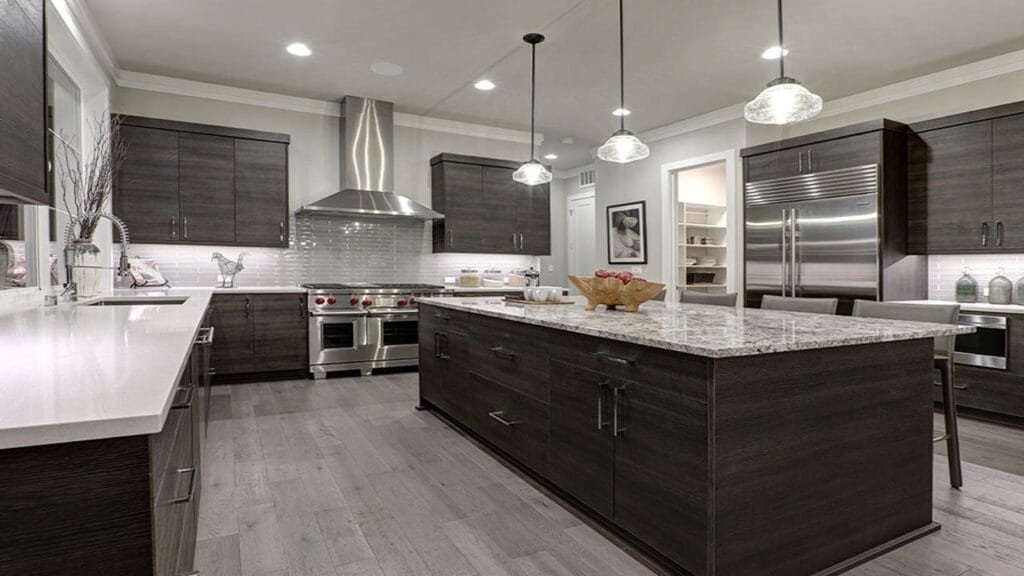
Luxury vinyl plank (LVP) and luxury vinyl tile (LVT) are the ideal vinyl flooring for kitchens due to their high durability, water resistance and ability to mimic real wood. Luxury vinyls can make the smallest of kitchens feel airier and warmer by their natural designs. Both LVP and LVT are affordable and incredibly versatile, making them a practical and stylish option for kitchens.
Moreover, it gives the appearance of hardwood but unlike solid wood, it’s much easier to clean and not susceptible to water damage. Although not very eco-friendly, LVP and LVT are easy to install and maintain making them perfect for kitchen flooring.
| Pros | Cons |
| Comfortable – to stand on for extended time. | Prone to scratches |
| High moisture resistance capabilities | Lifespan – may need to be replaced after a decade depending on the level of wear and tear |
| Low maintenance – highly convenient for kitchen flooring to be easy to clean | |
| Can mimic real wood | |
| Slip-resistant | |
| Acoustic properties – ideal for busy, noisy kitchen environment | |
| Budget-friendly |
Costing: The average cost for LVT and LVP in the UK ranges from £20-£60 per square metre.
Pay Weekly Flooring is known for providing LVT and LVP flooring in easy, affordable weekly and monthly instalments.
Linoumle
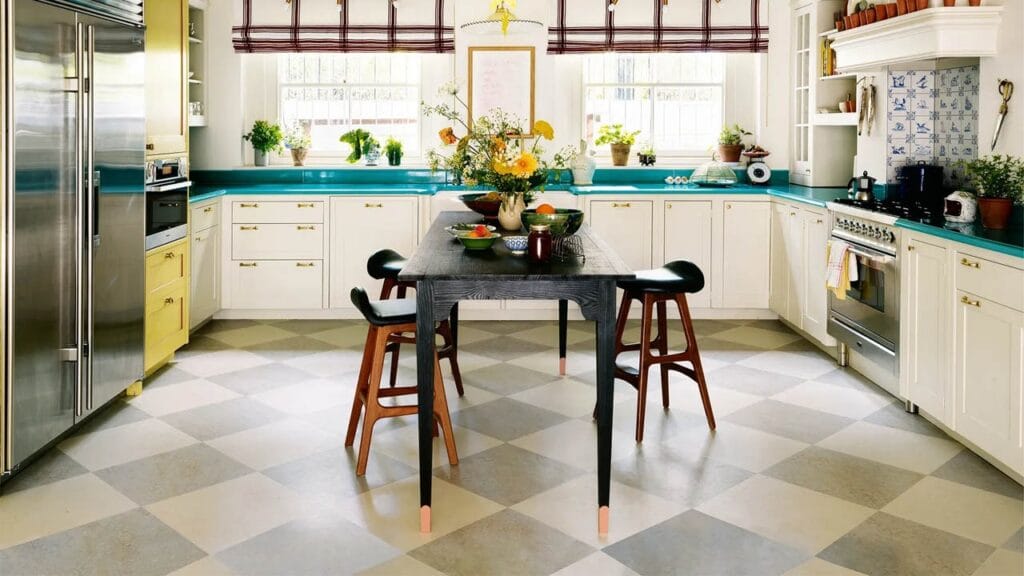
Linoleum is an eco-friendly, affordable flooring made from natural materials. Even though linoleum is prone to moisture damage and may dent under heavy weight. Yet Linoleum is gaining popularity for its sustainability and the underfoot comfort.
Moreover, linoleum in the kitchen is appropriate due to colour and pattern variety. Linoleum is also easy to install. It requires little to no maintenance. Also, it is perfect for those looking for an environmentally friendly option.
| Pros | Cons |
| Environmentally friendly – made from natural substances for a greener, sustainable kitchen | Less resilient – may not handle heavy foot traffic very well |
| Low maintenance – simple and easy to clean | Prone to water damage – but can be prevented by ensuring the seams are properly sealed, especially in areas prone to spills |
| Available in a wide range of designs |
Costing: The average cost for linoleum flooring in the UK is about £20-£40 per square metre.
Hardwood
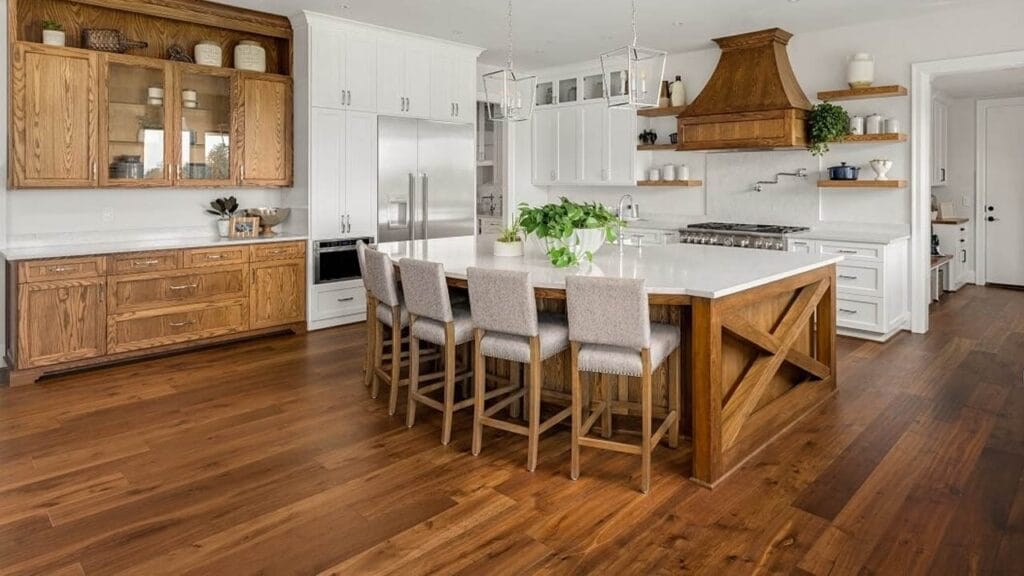
Hardwood is used in kitchens as it adds warmth and space to the area. However, it isn’t very waterproof, which makes it less ideal for kitchen flooring. It can also scratch or dent very easily and regular maintenance is needed to keep up the appearance. Hardwood’s aesthetic appeal is high and it can make any small room feel bigger.
Also, it is known to add natural beauty to any place with its smooth and elegant wood finish. If you’re cautious against spills and stains, hardwood can be a beautiful addition to your kitchen. It can also be refinished over time to look as good as new, saving you from the cost and hassle of a full replacement.
| Pros | Cons |
| Gives a classic, timeless look, that you can never go wrong with | Climate impact – extreme dry or humid conditions can damage hardwood |
| Refinishing abilities – can be sanded and refinished to look brand new so no replacing hassle | Sensitive to moisture |
| High maintenance – requires regular cleaning and is prone to stains and scratches. |
Costing: The average cost for hardwood flooring in the UK can range from £40-£100 per square metre.
Concrete
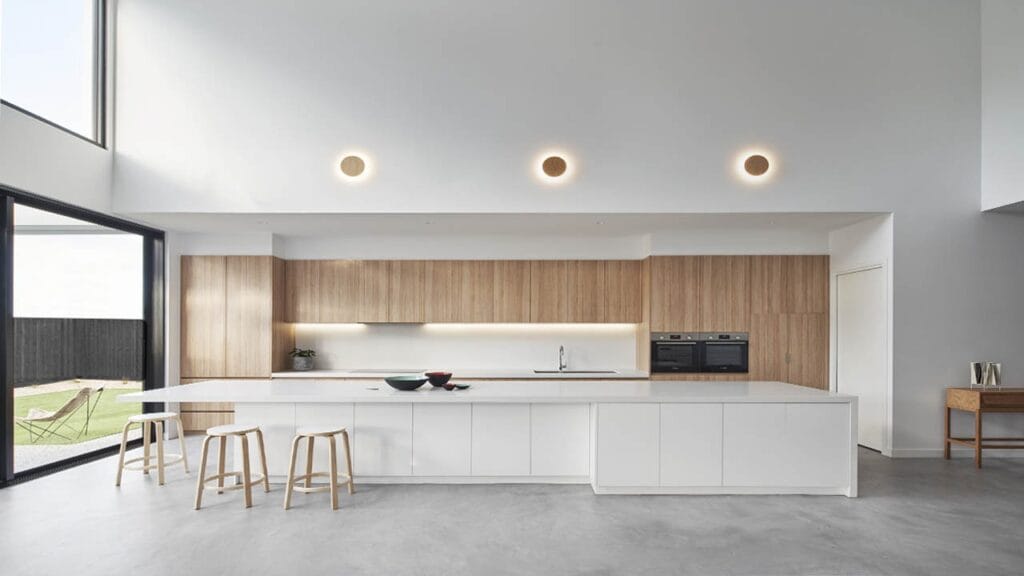
Concrete flooring is a highly durable, long-lasting, customisable option for kitchen floors. It’s extremely resistant to heat and impact but can be colder and hard underfoot. It’s favourable amongst industrial settings but can be adapted to home kitchens as well with many customised design options.
Besides a long lifespan, concrete is also budget-friendly. It’s important to note, however, that concrete does need to be placed on top of a floor that is already on an existing concrete slab, otherwise, it wouldn’t be able to withstand the weight of concrete. This cost-effective and economical option, when properly sealed and taken care of, can be a striking addition to kitchen interiors.
| Pros | Cons |
| Customizable – make your design to create a different look | Cold and hard surface – can be uncomfortable to stand on for long periods, although, can be managed with some rugs and floor heating |
| Highly durable |
Costing: The average cost in the UK for concrete floors is about £30-£70 per square metre.
Ceramic Tiles
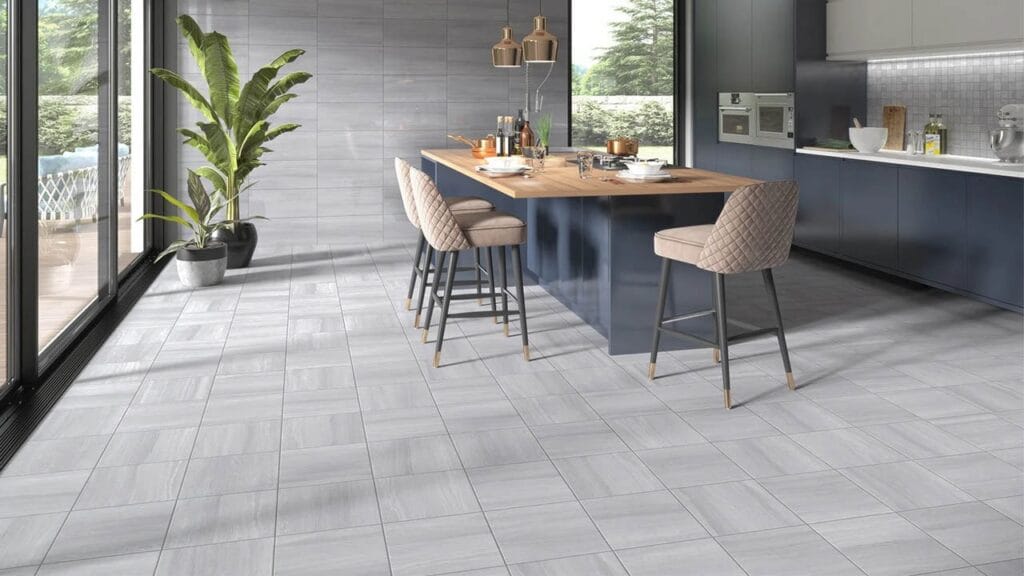
Ceramic tiles are very durable and water-resistant, making them a good fit for kitchen flooring. They’re available in a wide range of colours and designs, are easy to clean and can resist heat and stains. Although they can be difficult to stand on for an extended time, this can be easily combated by adding floor heating.
Moreover, ceramic tiles require professional installation. You can book an appointment for Pay Weekly Flooring professionals to visit your home for installation. Because properly installed ceramic tiles can be a long-lasting and beautiful addition to your kitchen.
| Pros | Cons |
| Design variety – comes in numerous colours and styles | Cold and hard surface – can be uncomfortable to stand on for long periods, although, can be managed with some rugs and floor heating |
| Moisture and heat-resistant | Professional installation is needed. |
Costing: The average cost for ceramic tiles in the UK is £15-£60 per square metre.
Most Popular Kitchen Flooring
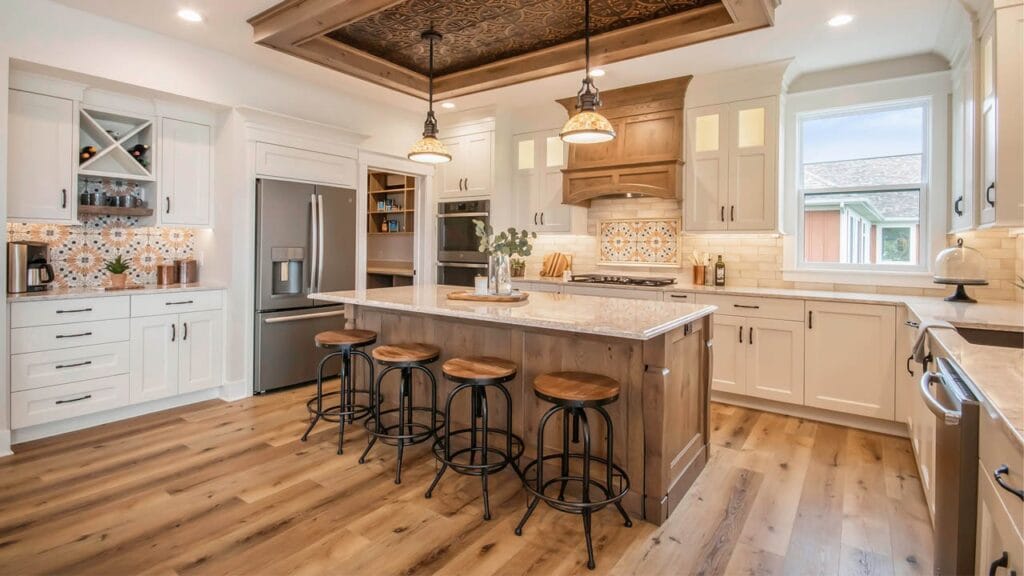
Among the many kitchen flooring options available, the most favourable by far is Vinyl flooring. Vinyl flooring is distinct into Luxury vinyl tile (LVT) or Luxury vinyl plank (LVP). Vinyls are water-resistant, durable, and affordable. They require very low and easy maintenance.
Although, LVP is easier to maintain than LVT. Yet, these two are great for providing a uniform look to your kitchen. Both these flooring options are also incredibly fashionable. These qualities make LVT and LVP highly suitable for kitchens, offering both practicality and style.
FAQs
What is the best flooring to make a kitchen look bigger?
Light-coloured, natural wood, or one that mimics wood, gives the illusion of a bigger kitchen. So, LVT or LVP flooring would be your best bet to make your kitchen seem airier.
What is the quality of an ideal kitchen floor?
The ideal kitchen floor is highly durable, moisture resistant, easy to clean, comfortable, and gives a nice aesthetic appeal to the kitchen. LVT and LVP tick all of these boxes.
What is the most durable type of flooring?
LVT and LVP are among the most durable options for kitchen flooring. They are highly resistant to moisture, scratches and stains, making them the perfect fit for your kitchen.
What is the most waterproof flooring?
LVP and LVT are the most waterproof compared to their counterparts like solid wood or linoleum. Designed to handle a high amount of water without swelling or damage, LVT and LVP make it so they are the perfect choice for kitchen flooring. Sheet vinyl is also a very water-resistant option.

